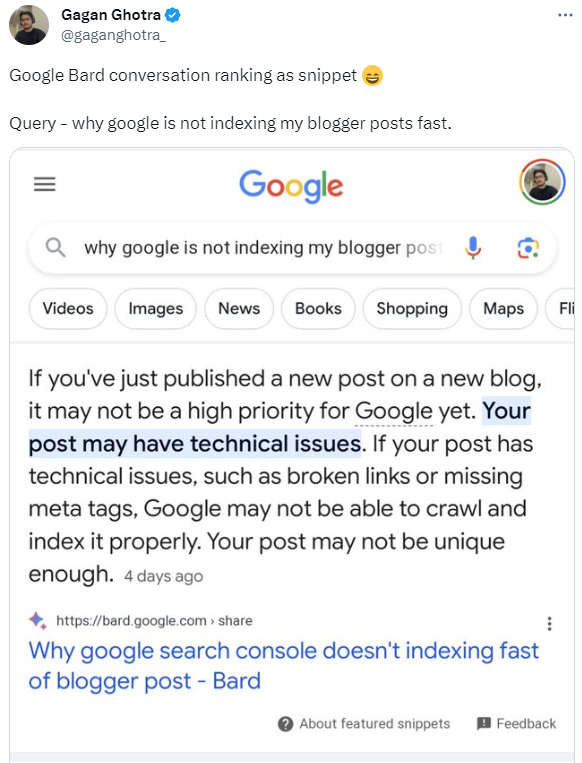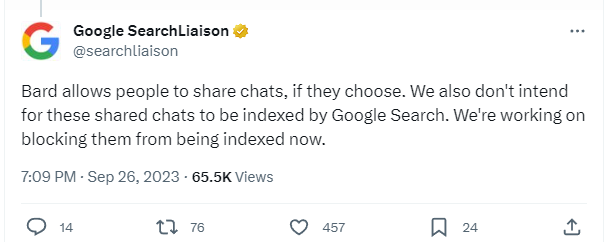Google has stated that the unintentional indexing of these conversations in its search engine results is being addressed, and steps are being taken to prevent it from happening again.
Alphabet’s largest subsidiary, the search engine giant Google, inadvertently exposed conversations between users and the Bard AI chatbot on its search engine results page due to the indexing of the “share conversation URL” feature on those search engine results pages.
Google Bard AI is a conversational generative artificial intelligence (AI) chatbot developed by Google. The chatbot is trained on a massive dataset of text and code enabling it to generate text, translate languages, write different kinds of creative content, and answer your questions in an informative way.
What is “share conversation URL”?
The “share conversation URL” feature in Bard AI allows you to share a link to your conversation with Bard with others. This can be useful if you want to collaborate with someone on a project, or if you want to share your conversation with a friend or colleague.
To share a conversation URL, simply click the “Share” button below the conversation. You will then have the option to share the entire conversation or just a specific prompt and response. Once you have selected what you want to share, click the “Create public link” button.
A pop-up will appear with the link to your conversation. You can then copy and paste the link into an email, chat message, or other document to share it with others.
Anyone with the link to your conversation will be able to view it, but they will not be able to edit or delete it. You can delete the link at any time to prevent others from accessing your conversation.
However, Google inadvertently indexed these conversation URLs on its search engine results pages, making them accessible to anyone conducting a Google search using the following link: (site:bard.google.com/share). As observed by Hackread.com, these conversations date back from July 2023 to the present day (September 27th).
Screenshots of All Conversations Visible on Google’s First Page
Google Also Ranked Google Bard AI Conversations as Snippets
According to Gagan Ghotra, a search engine optimization (SEO) consultant, Google also ranked Bard AI conversations as featured snippets. For your information, Snippets on Google are brief descriptions of web pages that appear in search results. They are typically generated by Google’s algorithms, but website owners can also provide custom snippets for their pages.
Snippets are usually displayed below the page title and URL, and they can include information such as the page’s description, meta tags, and content. Snippets are designed to give users a quick overview of what a page is about and to help them decide whether or not to click on it.
However, Google made the decision to rank conversations between users and Bard AI as snippets, a choice that may have seemed questionable to many.

Google’s response
Google has issued an official response to the situation. In a tweet directed to Ghotra, the Google Search Liaison X account (formerly known as Twitter) acknowledged that both problems were unintentional, and the company is actively working to prevent further indexation and remove the affected search results.
At the time of writing, over 300 pages of Bard AI user conversations were indexed on Google Search.

Privacy Breach?
Although, as analyzed by Hackread.com, the exposed chats did not contain financial information, payment card data, social media details, or any type of login credentials, it is crucial to categorize this incident as a privacy breach.
This is why experts strongly discourage users from sharing personal, sensitive, work-related, or financial information with these chatbots. Therefore, whether you are using Google Bard AI, ChatGPT, Microsoft’s Bing AI, or any other chatbot, it is essential to avoid conversations that could potentially expose you or your details to the public.
Furthermore, it is advised to disable conversation saving on all chatbots at all times. Nevertheless, since these chatbots are still in the development phase, such incidents should not come as a surprise. Previously, a vulnerability in OpenAI’s ChatGPT also exposed conversation titles to other users.
